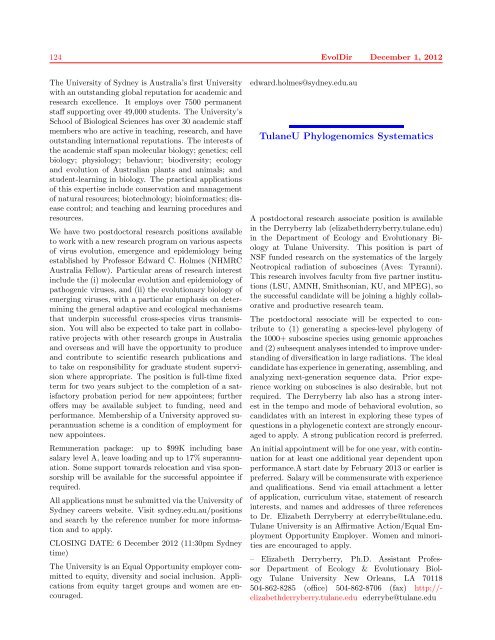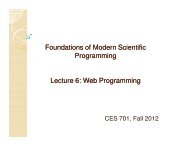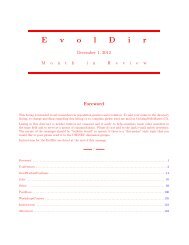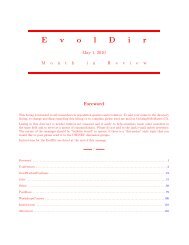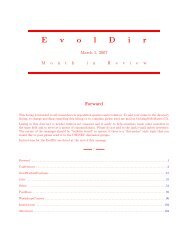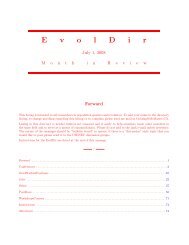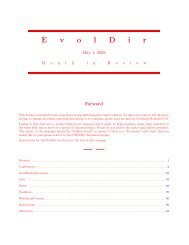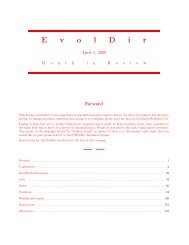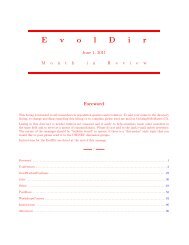E v o l D i r
E v o l D i r
E v o l D i r
Create successful ePaper yourself
Turn your PDF publications into a flip-book with our unique Google optimized e-Paper software.
124 EvolDir December 1, 2012<br />
The University of Sydney is Australia’s first University<br />
with an outstanding global reputation for academic and<br />
research excellence. It employs over 7500 permanent<br />
staff supporting over 49,000 students. The University’s<br />
School of Biological Sciences has over 30 academic staff<br />
members who are active in teaching, research, and have<br />
outstanding international reputations. The interests of<br />
the academic staff span molecular biology; genetics; cell<br />
biology; physiology; behaviour; biodiversity; ecology<br />
and evolution of Australian plants and animals; and<br />
student-learning in biology. The practical applications<br />
of this expertise include conservation and management<br />
of natural resources; biotechnology; bioinformatics; disease<br />
control; and teaching and learning procedures and<br />
resources.<br />
We have two postdoctoral research positions available<br />
to work with a new research program on various aspects<br />
of virus evolution, emergence and epidemiology being<br />
established by Professor Edward C. Holmes (NHMRC<br />
Australia Fellow). Particular areas of research interest<br />
include the (i) molecular evolution and epidemiology of<br />
pathogenic viruses, and (ii) the evolutionary biology of<br />
emerging viruses, with a particular emphasis on determining<br />
the general adaptive and ecological mechanisms<br />
that underpin successful cross-species virus transmission.<br />
You will also be expected to take part in collaborative<br />
projects with other research groups in Australia<br />
and overseas and will have the opportunity to produce<br />
and contribute to scientific research publications and<br />
to take on responsibility for graduate student supervision<br />
where appropriate. The position is full-time fixed<br />
term for two years subject to the completion of a satisfactory<br />
probation period for new appointees; further<br />
offers may be available subject to funding, need and<br />
performance. Membership of a University approved superannuation<br />
scheme is a condition of employment for<br />
new appointees.<br />
Remuneration package: up to $99K including base<br />
salary level A, leave loading and up to 17% superannuation.<br />
Some support towards relocation and visa sponsorship<br />
will be available for the successful appointee if<br />
required.<br />
All applications must be submitted via the University of<br />
Sydney careers website. Visit sydney.edu.au/positions<br />
and search by the reference number for more information<br />
and to apply.<br />
CLOSING DATE: 6 December 2012 (11:30pm Sydney<br />
time)<br />
The University is an Equal Opportunity employer committed<br />
to equity, diversity and social inclusion. Applications<br />
from equity target groups and women are encouraged.<br />
edward.holmes@sydney.edu.au<br />
TulaneU Phylogenomics Systematics<br />
A postdoctoral research associate position is available<br />
in the Derryberry lab (elizabethderryberry.tulane.edu)<br />
in the Department of Ecology and Evolutionary Biology<br />
at Tulane University. This position is part of<br />
NSF funded research on the systematics of the largely<br />
Neotropical radiation of suboscines (Aves: Tyranni).<br />
This research involves faculty from five partner institutions<br />
(LSU, AMNH, Smithsonian, KU, and MPEG), so<br />
the successful candidate will be joining a highly collaborative<br />
and productive research team.<br />
The postdoctoral associate will be expected to contribute<br />
to (1) generating a species-level phylogeny of<br />
the 1000+ suboscine species using genomic approaches<br />
and (2) subsequent analyses intended to improve understanding<br />
of diversification in large radiations. The ideal<br />
candidate has experience in generating, assembling, and<br />
analyzing next-generation sequence data. Prior experience<br />
working on suboscines is also desirable, but not<br />
required. The Derryberry lab also has a strong interest<br />
in the tempo and mode of behavioral evolution, so<br />
candidates with an interest in exploring these types of<br />
questions in a phylogenetic context are strongly encouraged<br />
to apply. A strong publication record is preferred.<br />
An initial appointment will be for one year, with continuation<br />
for at least one additional year dependent upon<br />
performance.A start date by February 2013 or earlier is<br />
preferred. Salary will be commensurate with experience<br />
and qualifications. Send via email attachment a letter<br />
of application, curriculum vitae, statement of research<br />
interests, and names and addresses of three references<br />
to Dr. Elizabeth Derryberry at ederrybe@tulane.edu.<br />
Tulane University is an Affirmative Action/Equal Employment<br />
Opportunity Employer. Women and minorities<br />
are encouraged to apply.<br />
– Elizabeth Derryberry, Ph.D. Assistant Professor<br />
Department of Ecology & Evolutionary Biology<br />
Tulane University New Orleans, LA 70118<br />
504-862-8285 (office) 504-862-8706 (fax) http://elizabethderryberry.tulane.edu<br />
ederrybe@tulane.edu


